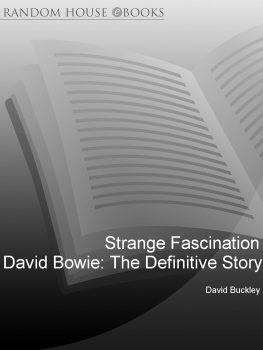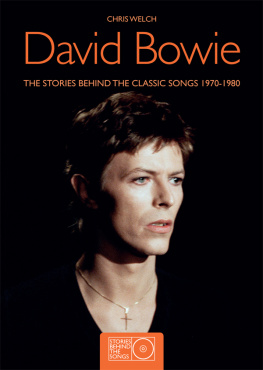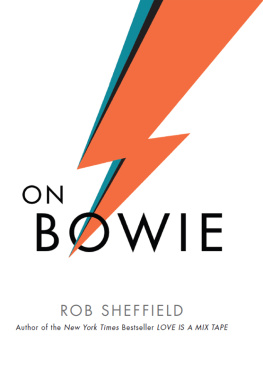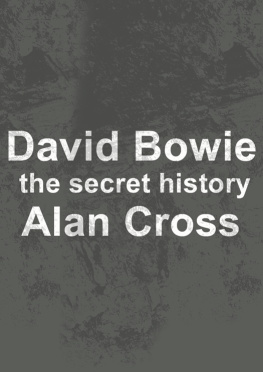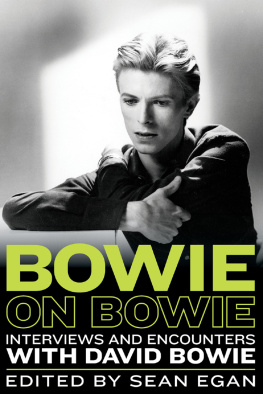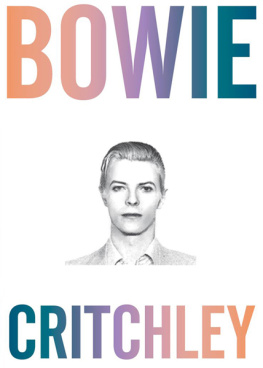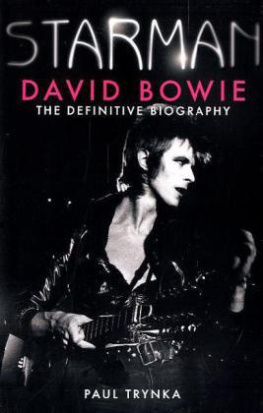CONTENTS
About the Book
As a critique-cum-re-establishment of the David Bowie character, definitive is pretty much it Guardian
DAVID BOWIE is now into his fifth decade of making music. From his first hit single, Space Oddity, to his vital 21st-century albums Heathen and Reality, he remains the most influential rock star of his generation. Strange Fascination chronicles Bowies career against the colourful backdrop of post-Beatles pop culture, taking us from the glam-era gender-bending of the early 1970s, through plastic soul, the Berlin period, Scary Monsters and the huge international success of Lets Dance right the way up to his most recent collaborations and his poineering use of the Internet. Its a story of amazing creativity, of huge, showboating theatricality and of a never-ending quest to remain relevant and at pops cutting edge.
David Buckleys unique approach to unravelling the Bowie enigma, via interviews with many of the singers closest associates, biography and academic analysis, makes this unrivalled biography a classic for Bowie fans old and new. This revised edition of Strange Fascination comes at a time when Bowie is, once again, on a creative roll, and captures exclusive details about the tours, the making of the albums, the arguments, the split-ups, the music and, most importantly, the man himself. Also including exclusive photographic material, Strange Fascination is the most complete account of David Bowie and his impact on pop culture ever written.
Also by David Buckley
The Complete Guide to the Music of David Bowie
(Omnibus Press, 1996)
The Stranglers: No Mercy The Authorised and Uncensored Biography
(Hodder and Stoughton, 1997)
R.E.M.: Fiction An Alternative Biography
(Virgin Books, 2002)
The Thrill of it All: The Story of Bryan Ferry and Roxy Music
(Andr Deutsch, 2004)
David Bowie The Complete Guide to His Music
(Omnibus Press, 2004)
For my mum and dad,
Mabel and Harold Buckley
STRANGE FASCINATION
Buckley manages the ultimate achievement of any rock biog and sends you scuttling back to the records
The Guardian
Strange Fascination lives up to its title, presenting a compelling portrait of a complex man whose career has matched the shifting ideology of rock culture over the last 35 years
Record Collector
A mighty fine tome, as important as it is earnest
Uncut
UNCAGE THE COLOURS
Bowie was never meant to be. Hes like a Lego kit. Im convinced I wouldnt like him, because hes too vacuous and undisciplined. There is no definitive David Bowie.
(DAVID BOWIE ON DAVID BOWIE, 1976)
DAVID BOWIE HAS just entered his fifth decade of making pop music, and for four of those decades he has been one of the most photographed, adored, imitated, admired and talked-about rock stars of the post-Beatles period. He is a heroic heretic who in the 1970s redefined what it was to be a star, in the 1980s became a hugely successful, Hollywood-styled mainstream pop icon and in the 1990s ended up a self-reinvented cultural aesthete. In the Noughties, he is arguably the only rock star of his vintage still consistently making music that is not just listenable, but challenging and vital too. Perhaps, as for pop music itself, his years of true devilment and highest innovation are now gone. But his impact on pop music has been seismic. Strange Fascination tries to explain why.
After the eclipse of Marc Bolan, for two years 1972 and 1973 Bowie was the biggest pop star in the UK. Since then, his fortunes have waxed and waned, but he has always been able to count on a community of hardcore fanatics, a seemingly self-generating troop of doughty followers who make him still the biggest cult icon in pop. His work in the second half of the 1970s consolidated his reputation as a style guru, a man, so the story went, always one step ahead of his competitors. What Bowie did one year, the world did the next. He had both commercial clout and artistic kudos. By the 1980s, he was increasingly being regarded as played-out, and it became fashionable to denigrate his achievements, to trash each new album good, bad, or indifferent on release. Bowie has been on the receiving end of more petty literary vendettas than perhaps any other figure in pop. By the mid-1990s he had been partially rehabilitated and, at the time of writing, Bowie is once again one of the most revered artists in contemporary music.
Yet his influence and legacy have never been acknowledged in a major book. Unlike Dylan, Lennon, Zappa, Prince, Kraftwerk, Bolan, The Sex Pistols, Abba and Elvis Presley, all major players in post-rocknroll pop, Bowies work (rather than his life) has never been the subject of a book-length study.
Bowies career is littered with far more brilliant highs than infuriating lows. Just one person took glam rock to new rarefied heights and invented character-playing in pop, marrying theatre and popular music in one seamless, powerful whole. Two years later, that same person broke the then contemporary sounds of black America into the British white audience, the effect of which was to establish a tradition of blue-eyed soul in the UK pop charts. Two years further on and this same individual was producing, with collaborators Brian Eno and Tony Visconti, the most challenging pieces of modernist art housed in rock trappings that one could imagine. A little later again, the same person virtually defined the ways in which pop and video could be combined, with a series of stunningly inventive videos. No other pop star of Bowies generation has survived the almost inevitable downswing in creativity that sooner or later occurs in order to go on to produce albums as experimental and flamboyant as 1. Outside and Earthling. In the Noughties, Bowie received the best press of his long career for Heathen and Reality. If Bowie ever fails, its almost always an interesting failure, which is the mark of a great artist.
This book is also about his great songs, his poor songs, his good movies, his not-so-good movies; those hes been influenced by and those hes influenced. It is about his brilliant performances and videos, his studio craft, his vocal style, his politics (sexual and otherwise) and his fans. Above all, it is perhaps about a tradition in British popular music: a tradition of irony and theatricality in popular music. It is for people who are quite comfortable when the aural stimulus is housed in visual information as powerful as the music it complements, not for those who look to pop to provide a package of pure sound and no vision.
For many teenagers (even pre-teenagers) and twenty-somethings in the 1970s and early 1980s, David Bowie was the only rock star who really mattered. He was, during this period, omnipotent without ever being omnipresent. In the UK at least, he was perhaps the most written-about pop star of his age. His music and personae were weighty enough to make legions of rock scribes wax lyrical, and his recreational pastimes and photogenic looks were resonant enough for the tabloid media to splash him on front covers for well over a decade. He was serious and trashy, manipulative and manipulated, and (for a time at least) both man and woman figuratively speaking, of course. A very real sense of lack, despite this welter of comment, made him in a way unobtainable, at least to his fans. Even though huge quantities of albums (estimated today at around 140 million) and singles (around 10 million in the UK alone) were sold, fans exposure to Bowie in the media was always rationed. In the 1970s he made just three appearances on the BBCs crucial

